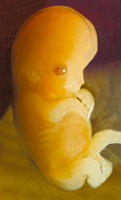Marriage followed by pregnancy and a beautiful baby are the expectations of many a couple. Regrettably, it is not always so. Sometimes the couple has to face a miscarriage or premature birth and miscarriages are a common problem occurring in about 20% of all pregnancies.
The ‘age’ of a pregnancy is described in weeks, with a ‘mature’ baby being more than 37 weeks. The age on the expected date of delivery given at the clinic is 40 weeks.
Miscarriage
The medical definition of a miscarriage is ‘expulsion of products of conception’ (a growing baby and other tissues) before reaching potential viability after delivery (24 weeks or 500g).
 |
| 10 -week-old foetus |
Babies who are born before 24 weeks or are less than 500g at birth cannot be saved even with all the modern facilities. Babies of 24 to 32 weeks can be described as ‘extreme prematurity’ and need extra special care in baby units of hospitals.
Early miscarriage
Many miscarriages occur in early pregnancy or before 12 weeks. This is the common time of miscarriage and the most likely reason is that something is seriously wrong with the baby. These babies with chromosomal abnormalities cannot be saved and pass away very early. Generally, the first symptom of a miscarriage is bleeding and many mothers with a non-viable miscarriage (already passed away) do not have the common symptoms of pregnancy such as nausea and vomiting.
Late miscarriage
A late miscarriage occurs after 12 weeks, with the causes being different such as abnormalities of the womb or loose neck of the womb (cervical incompetence) and maybe treatable.
Management of miscarriage
With bleeding in pregnancy being the first symptom of a miscarriage, most expectant mothers take bed-rest, sometimes even without seeking medical advice. However, patients need to be careful as two other serious conditions – ectopic and molar pregnancies can mimic a miscarriage.
In an ectopic pregnancy, the pregnancy (formation of the foetus) occurs outside the womb, may be in the fallopian tube or the ovary and there is a serious risk of rupture inside the abdomen causing severe internal bleeding. An abdominal operation may be necessary in such a pregnancy to remove the ectopic.
Meanwhile, H. mole is a tumour arising from the tissues of pregnancy which has a risk of bleeding and also becoming cancerous later.
Threatened miscarriage
When a mother has bleeding in the first 24 weeks of pregnancy with a live baby, a threatened miscarriage is suspected and an ultrasound scan is useful in confirming whether the baby is alive. In a threatened miscarriage, the mother is asked to rest, with progesterone hormone support given.
Non-viable miscarriage or
silent miscarriage
Here the baby has already passed away and cannot be saved. Therefore, treatment should be aimed at emptying the womb through the Evacuation of Retained Products of Conception (ERPC) or womb wash and avoiding complications.
 |
| An ectopic pregnancy, (above) and H molar (below) can mimic a miscarriage |
|
When diagnosis is not easy, the level of the pregnancy hormone hcG in the mother’s blood is tested as different levels will be indicated in a viable miscarriage, a non-viable miscarriage, an ectopic pregnancy or in H. mole.
Complete miscarriage
There is a complete emptying of the womb spontaneously and as such an ERPC is not necessary.
Recurrent miscarriage
This is when a mother has three or more miscarriages. Such mothers need extensive investigation as special treatment is available for them.
Abortion
Those days, abortion and miscarriage were deemed to be similar but now abortion describes the “removal” of a living pregnancy before 24 weeks. Some mothers think of abortion as an answer when they find themselves to be pregnant but are not ready for it.
However, abortion is illegal in Sri Lanka and the termination of a pregnancy is permitted only if the mother’s life is in danger if the pregnancy continues. Two medical officers need to certify that the mother’s life is in danger and such a legal abortion is called a therapeutic termination of pregnancy. All non-therapeutic abortions are illegal and are criminal abortions.
While the therapeutic termination of pregnancy may be performed if the mother is suffering from severe heart disease or some types of cancer, foetal abnormalities or pregnancies after rape or pregnancies in underage children do not qualify for therapeutic terminations in Sri Lanka.
Complications
The possible complications of miscarriage and abortion are heavy bleeding, infection, injury during the operation and anaesthesia problems. There is also the risk of the fallopian tubes getting infected which could result in a blockage later. |
